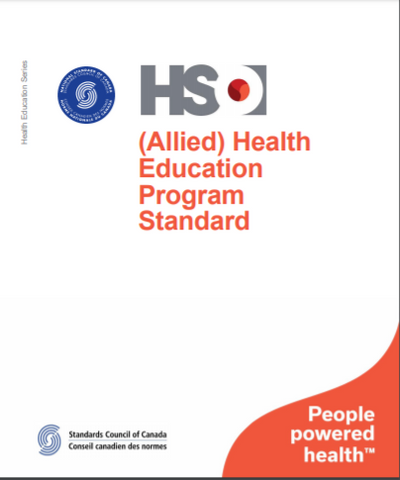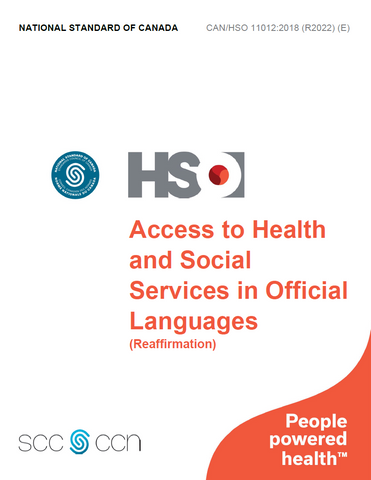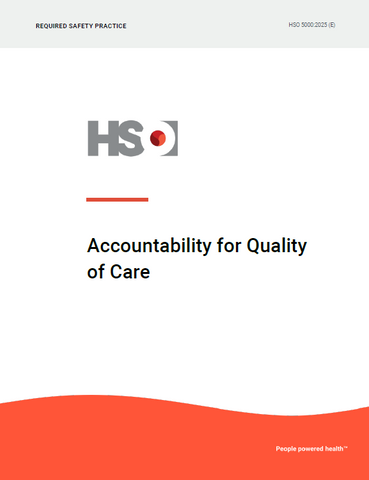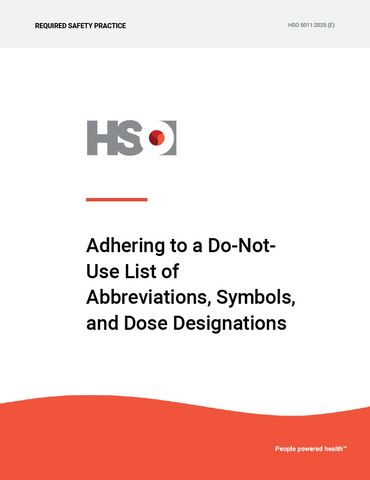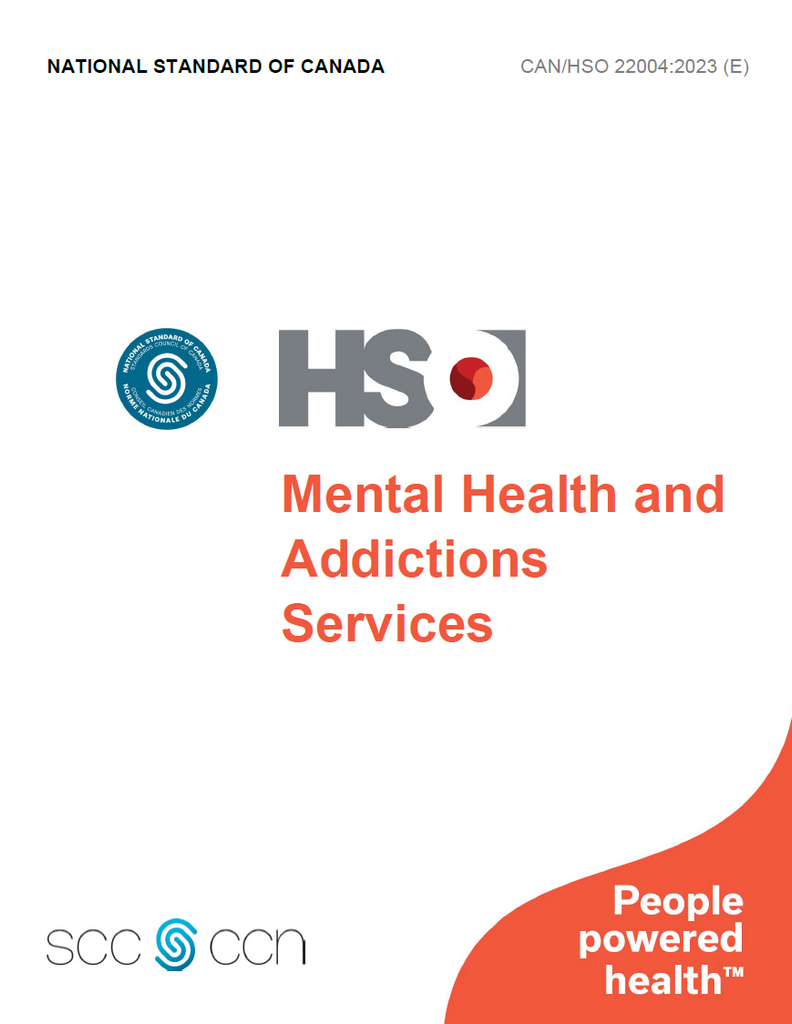
Mental Health and Addictions Services - CAN/HSO 22004:2023 (E)
About HSO's Standards
HSO’s standards are the foundation on which leading-edge accreditation programs and evidence-informed public policy are built. Standards create a strong people-centred health care system that stakeholders can rely on to enable people around the world to continuously improve quality of care.
HSO’s standards are formatted using the following structure:
- Section title. A section of the standard that relates to a specific topic.
- Clause. A thematic statement that introduces a set of criteria.
- Criteria. Requirements based on evidence that describe what is needed by people to achieve a particular activity. Each criterion outlines the intent, action, and accountability.
-
Guidelines. Additional information and evidence to support the implementation of each criterion.
About This Standard
CAN/HSO 22004:2023 (E) Mental Health and Addictions Services builds on the following HSO standards to form a new standard:
- HSO 34019:2018 (E) Mental Health Services
- HSO 22004:2018 (E) Substance Abuse and Problem Gambling
- HSO 34007:2018 (E) Community-Based Mental Health Services and Supports
CAN/HSO 22004:2023 (E) Mental Health and Addictions Services is based on findings from literature reviews, clinical expertise, evidence-informed practices, and those with lived experiences. The published evidence used to inform this standard can be found in the bibliography.
This standard focuses on the delivery of client-centred care by dedicated mental health teams and addictions teams. This approach was taken to ensure the client receives safe, reliable, and high-quality care that is based on their goals, abilities, and preferences.
The content of this standard is structured into the following sections:
- Promoting Client-Centred Care in Mental Health and Addictions Services
- Respecting Client Rights in the Delivery of High-Quality Mental Health Care and Addictions Care
- Delivering High-Quality Mental Health Care and Addictions Care Based on the Goals, Abilities, and Preferences of Clients
- Ensuring Continuity of Mental Health Care and Addictions Care for Clients across the Lifespan
- Enabling a Healthy and Competent Workforce to Support the Delivery of High-Quality, Client-Centred Mental Health and Addictions Care
This standard integrates the principles of equity, diversity, and inclusion outlined in Annex A: Guiding Principles for Equity, Diversity, and Inclusion.
This standard is aimed at the following key audiences:
- Organizational leaders and members of the workforce providing mental health services or addictions services or both. This standard provides these audiences with information on delivering high-quality, client-centred mental health and addictions services that ensure continuity of care for clients across the lifespan.
- Clients, designated support persons, and communities. This standard provides these audiences with information that allows them to co-design mental health and addictions services and participate in and support high-quality care as active members of the team.
- Policy makers and health care stakeholders. This standard provides these audiences with quality and safety guidance to inform policy development, build a healthy and competent workforce for the future, and ensure the delivery of high-quality, client-centred mental health and addictions services that ensure continuity of care for clients across the lifespan.
The published evidence used to inform this standard can be found in the bibliography.
This standard is intended to be used as part of a conformity assessment. This standard will undergo periodic maintenance. HSO will review and publish this standard on a schedule not to exceed five years from the date of publication.
Scope
Purpose
This standard provides guidance to organizational leaders and members of dedicated mental health teams and addictions teams working in health and social service organizations that provide direct care to people seeking mental health and addictions services.
This standard specifies the accountabilities of organizational leaders and members of dedicated mental health teams and addictions teams to deliver high-quality, client-centred mental health or addictions services that ensure continuity of care for clients across the lifespan.
This standard does not prescribe a particular approach or intervention. Instead, it focuses on how dedicated mental health teams and addictions teams should provide care to meet the holistic needs of clients across the lifespan, regardless of diagnoses.
Applicability
This standard applies to organizational leaders and members of dedicated mental health teams and addictions teams working in health and social service organizations across all care settings.
In this standard, we sometimes use the expression mental health and addictions recognizing that clients may experience mental health symptoms or addictions symptoms or both. Because clients often experience mental health and addictions symptoms at the same time, and because supports for these symptoms are similar, some references to the two areas have been combined to refer to the teams, care, services, resources, and organizations that support them.
The defined client population for this standard is people of any age who are receiving mental health services or addictions services or both from health and social service organizations.
Clients may receive care in various settings. For example, care settings may include environments in which teams provide acute care, ambulatory care, home care, community care, forensic care, crisis services, withdrawal management and detox services, or addictions care.
Acknowledgements
HSO is grateful to and acknowledges the valuable contributions of the Youth Mental Health and Addiction Services Expert Panel. The panel’s feedback on applicable content for inclusion in CAN/HSO 22004:2023 (E) Mental Health and Addictions Services helped to ensure the content reflects HSO’s commitment to addressing the needs of people throughout their lives, specifically those of youths.
HSO is also grateful to and acknowledges the valuable contributions of the following people in the development of this standard. Their feedback helped to ensure the content is clinically relevant to all populations and specifically reflects the needs of youth.
- Eloise Ballou, MD, FRCPC, University of Toronto, Ontario, Canada
- Joshua I. Miller, MSW, RSW, Youth Adviser, HSO Faculty, Ontario, Canada
- Peter Selby, MBBS, CCFP (AM), Professor, Department of Family and Community Medicine and Psychiatry, University of Toronto, and Senior Medical Consultant, Centre for Addiction and Mental Health, Ontario, Canada
- Jennifer Wilkie, MHSc, CHE, HSO Faculty, Ontario, Canada
HSO is an independent, not‑for‑profit corporation and is registered in Canada as a charity, in accordance with Canada Revenue Agency rules, with a mandate to enable and empower people around the world to continuously improve quality of care.
While designated as a Standards Development Organization by the Standards Council of Canada (SCC), HSO operates independently from SCC. HSO does not receive ongoing funding from SCC, other crown corporations of Canada, or federal or provincial entities.
HSO charges a nominal fee to help offset the associated costs of development and maintenance of HSO standards, as most HSO standards are self-funded.
If cost is a barrier to accessing an HSO standard, please email publications@healthstandards.org and a team member will assist you.
Standards available for purchase through this E-Store are considered HSO standards and must only be used in accordance with applicable HSO Terms of Use or client agreement and are not applicable for assessment purposes. If you are part of an assessment program such as the Qmentum accreditation program, with one of our partners including Accreditation Canada, Qualicor Europe, IQG, or IQMH, your assessment body will provide you with the assessment standard prior to the standard being incorporated into your program and used for surveys or assessment purposes. For information on assessment standards, or to obtain the version specific to your program, please contact your assessment provider.
Standards purchased online are delivered as printable PDF downloads. If you would like a copy printed and shipped to you, please email publications@healthstandards.org.

